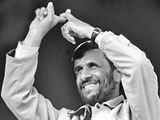|
|
TODAY.AZ / Politics
Ahmadinejad defiant, challenges Bush to TV debate
29 August 2006 [16:44] - TODAY.AZ

In a news conference, Ahmadinejad condemned the U.S. and British role in the world since World War Two but made no direct mention of the international nuclear confrontation.
"I suggest holding a live TV debate with Mr. George W. Bush to talk about world affairs and the ways to solve those issues," he said.
The U.N. Security Council has given Iran until Thursday to suspend uranium enrichment -- a process which can produce fuel for reactors or explosive material for warheads -- and has threatened sanctions unless it does so.
Washington has called for a swift response if Iran does not meet the deadline. But analysts say divisions at the United Nations about how to handle Iran's file could delay such a move.
Iran has shown no sign it will halt enrichment. The world's fourth largest oil exporter has shrugged off the threat of sanctions and said such a move would simply push oil prices up to intolerable levels for industrialized economies.
"If the Western countries have the intention to have comprehensive, long-term cooperation with Iran then they should not pursue imposing sanctions on Iran," Iran's chief nuclear negotiator Ali Larijani said on state TV late on Monday.
He also said Iran's effort to master the nuclear fuel cycle was "irreversible" -- echoing earlier comments by the president and Supreme Leader Ayatollah Ali Khamenei, who is the highest authority in Iran.
Iran has said it is ready for immediate talks on its atomic plans but has refused to suspend enrichment before negotiations start, which was proposed in a package of incentives offered by the United States, China, Russia, France, Britain and Germany.
Russia and China, big trade partners of Iran who have veto powers in the U.N. Security Council, may oppose any move toward sanctions.
Washington, which already imposes unilateral sanctions on Iran, has suggested it could consider action outside the Security Council with other like-minded countries.
Iran has said action without the council's backing would be an insult to the world body. Analysts say such a coalition might only have a limited impact on Iran if it did not include major trade partners, such as Germany, Italy and Japan.
/Reuters/
URL: http://www.today.az/news/politics/29518.html
 Print version
Print version
Connect with us. Get latest news and updates.
See Also
- 23 February 2026 [13:13]
Guarantees of peace from Armenia: questions remain - 23 February 2026 [12:38]
President Ilham Aliyev sends congratulatory letter to Sultan of Brunei Darussalam - 23 February 2026 [12:37]
President Ilham Aliyev sends congratulatory letter to Emperor of Japan - 23 February 2026 [12:10]
President Ilham Aliyev signs decree on conscription for active military service - 23 February 2026 [11:55]
President Ilham Aliyev awards group of AzerGold employees with "Taraggi" medal - decree - 23 February 2026 [11:19]
President Ilham Aliyev receives delegation led by Iranian Minister of Roads and Urban Development - 22 February 2026 [19:00]
Azerbaijan Defense Ministry releases weekly summary video [VIDEO] - 22 February 2026 [16:39]
Azerbaijani Defense Minister visits Air Force Units - 22 February 2026 [15:11]
Head of State Service for Mobilization and Conscription listens to citizens' appeals - 22 February 2026 [14:25]
President Ilham Aliyev sends congratulatory letter to King of Saudi Arabia
Most Popular
 Japan seeks peace treaty with Russia despite ongoing territorial dispute
Japan seeks peace treaty with Russia despite ongoing territorial dispute
 China, Iran, Russia to hold Middle East drills
China, Iran, Russia to hold Middle East drills
 TURKPA and OSCE PA discuss expanded cooperation at 25th Winter Session in Vienna
TURKPA and OSCE PA discuss expanded cooperation at 25th Winter Session in Vienna
 Poland bans Chinese cars from military facilities
Poland bans Chinese cars from military facilities
 Gran Tierra to begin Azerbaijan onshore exploration under new SOCAR agreement
Gran Tierra to begin Azerbaijan onshore exploration under new SOCAR agreement
 Europe seeks energy independence as Azerbaijan advances Black Sea green power corridor [COMMENTARY]
Europe seeks energy independence as Azerbaijan advances Black Sea green power corridor [COMMENTARY]
 Azerbaijan aligns with China’s Belt and Road strategy through Middle Corridor
Azerbaijan aligns with China’s Belt and Road strategy through Middle Corridor
